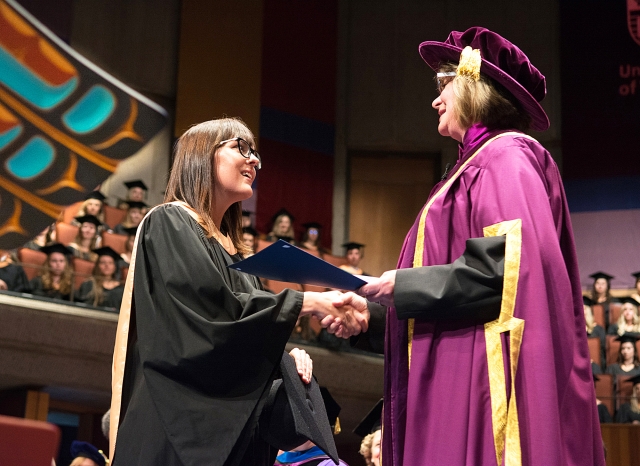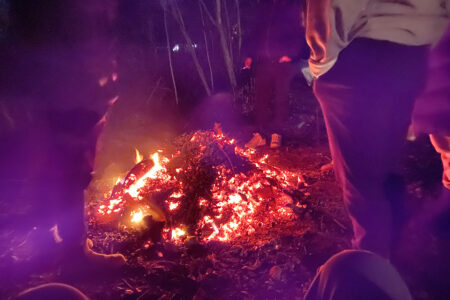Selkirk College Graduating Nursing Student Recognized for Top Marks by University of Victoria
Selkirk College nursing graduate Holli Norberg was recently recognized by the University of Victoria for top marks in the faculty of Human and Social Development which partners with the local school in offering the Nursing degree program.
There are over 3,500 students enrolled in the faculty.
Norberg, a Nelson resident, took advantage of the opportunity to complete her four-year Nursing degree at Selkirk College graduating with a University of Victoria Bachelor of Science in Nursing. At the spring convocation in Victoria, she was presented with the Certificate of Outstanding Academic Distinction.
“It’s a wonderful recognition. I am extremely appreciative of all of the support I received from both Selkirk College and the University of Victoria that enabled me to achieve a level of academic distinction,” says Norberg.
UVic Dean of Human and Social Development Tricia Marck presented Norberg with her certificate and shared words showing the character and strong academic accomplishment of the local student.
“Holli’s instructors shared that she was a spectacular student, thinking deeply about the topics she studied and demonstrating leadership in multiple domains of practice. She worked with clients, peers, and instructors in ways that were respectful, inclusive, and visionary,” Marck says.
Norberg, 26, grew up in Williams Lake and moved to Nelson for her final year of secondary school at L.V. Rogers. After high school she worked full time and travelled before returning to her studies.
She was attracted to the nursing profession because it can be so diverse, offering various avenues to explore leadership, ways to promote health, and build relationships. Selkirk College offered her a strong education and sense of community she credits for her student success.
“I had a really solid network of people on my side,” she says. “The genuinely caring and supportive faculty provided opportunities to learn so much more than a biomedical approach to nursing, which really motivated me to be a healthier person from year one.
I began to integrate more self-care, engage more in the community, and spend more time doing things I loved, which, believe it or not, was not schoolwork. I think the secret to being a strong student is balance and being good to oneself.”
While studying at Selkirk College, Norberg was chosen as one of two students to go to Suriname in South America to work on the development of standards in geriatric nursing education.
It was an opportunity for Norberg to learn from a team of passionate people working to help enhance higher education in developing countries.
“It was unforgettable and felt like an inimitable learning opportunity,” she says.
“I was able to improve and gain skills that I will continue to apply in my future career, such as communication, collaboration, leadership, creativity, patience, and cultural awareness. These are all essential for being a nurse that stands out and contributes toward progression and change.”
While the nursing program is challenging in itself, Norberg continued to seek out options to round out her education. She volunteered with the Canadian Cancer Society and served as a student representative on the College of Registered Nurses of British Columbia.
It wasn’t always easy for the strong student who overcame challenges by staying connected to life outside Selkirk College.
“The first year was a huge transition for me,” Norberg says.
“To begin studying full time after working and traveling for years after secondary school was a bit uncomfortable. Keeping my job part-time and volunteering helped my life feel more normal.”
Norberg is passionate about the health of the planet and its people and co-habitants and is motivated to do what she can to contribute to global solutions.
While studying at Selkirk College, she took the Unarmed Civilian Peacekeeping Program to learn more about how to reduce conflict and harm using non-violent principles. She feels the knowledge gained will enhance her nursing abilities and help her work toward her goal of healthy communities.
“It has enhanced my ability to think critically and inquisitively in all aspects of life,” she says.
“Whether it’s climate change initiatives, peaceful approaches to conflict, proper sanitation and access to medicine for prevention and treatment of communicable diseases, or small-town health promotion programs, I will find where I belong; I am motivated and committed to working toward stronger, healthier communities and nations.”
As Norberg looks ahead, she isn’t sure what’s next though she’d love to continue pursuing her education in medicine, or a Master’s degree in the field of community and global health.
“I’m addicted to academia,” she says.






















